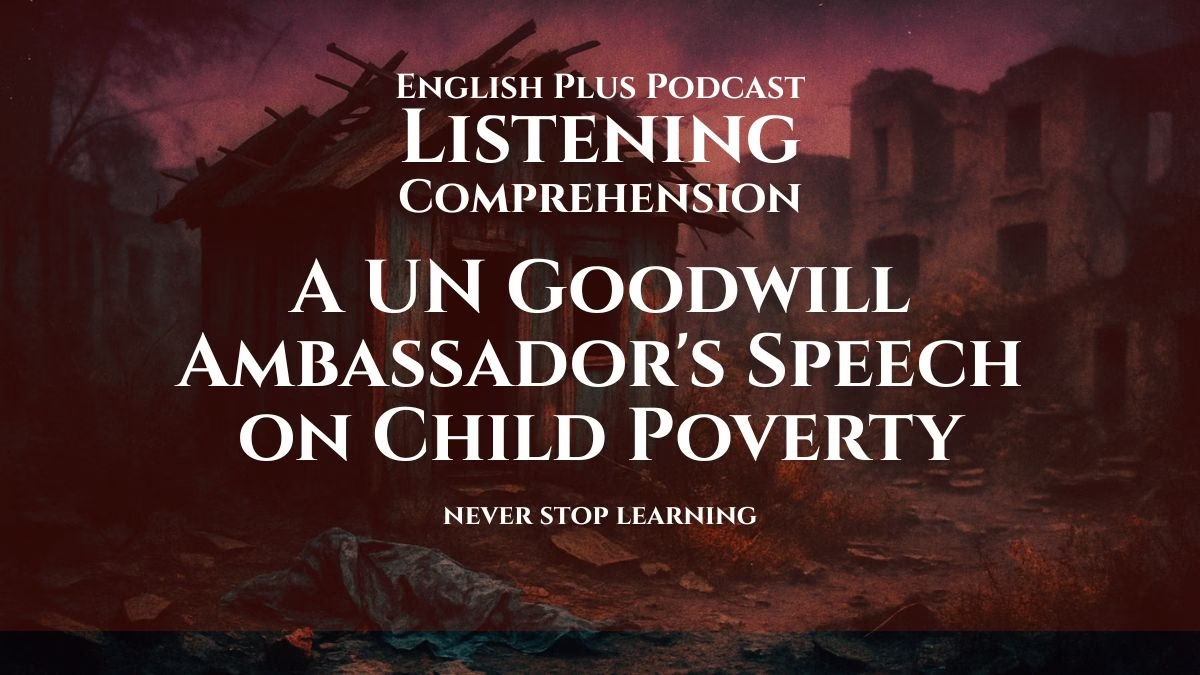How to Improve Your Listening Skills
Hello there! Welcome to this listening practice session. In high-stakes exams, you’re often asked to understand not just what is said, but also how it’s said. The speaker’s tone, purpose, and attitude are just as important as the facts they present. This exercise, a persuasive speech, is perfect for practicing this skill. Here are some tips:
- Listen for the Speaker’s Purpose: As you listen, ask yourself: What does the speaker want me to do, think, or feel? Are they informing, persuading, or warning? Identifying the purpose helps you understand the main message.
- Pay Attention to Emotive Language: Persuasive speakers use words that appeal to emotions. Notice words that convey urgency, sadness, or hope. This will help you answer questions about the speaker’s attitude or tone.
- Distinguish Main Ideas from Supporting Details: The speaker will have a few core messages. They will support these with stories, statistics, or examples. In your notes, try to structure them this way: a main point, and then the details that support it underneath. This helps you see the big picture without getting lost in the details.
Listening Topic: A UN Goodwill Ambassador’s Speech on Child Poverty
You are about to hear a speech delivered by a UN Goodwill Ambassador. The topic is one of global importance: child poverty. As you listen, anticipate the kinds of arguments the speaker might make. Think about the connection between poverty and a child’s future. What are the consequences, and what might be the solutions? Preparing your mind for these themes will make it easier to follow the speaker’s message.
Key Words and Phrases
Here are some important words and phrases from the speech. Understanding them is key to grasping the speaker’s core message.
- Unconscionable: This describes something that is so morally wrong or unfair that it should make you feel ashamed. In the speech, the speaker calls the number of children living in poverty an “unconscionable reality.”
- Latent potential: This refers to the hidden talents and abilities that exist within a person but have not yet been developed. The speaker argues that poverty tragically wastes the latent potential of millions of children.
- Pernicious: This is an adjective for something that has a harmful effect, especially in a gradual or subtle way. The speech describes poverty as a “pernicious thief” that steals a child’s future.
- Intergenerational: This means something that is passed down from one generation to the next. We use it to talk about the “intergenerational cycle of poverty,” where children born into poor families often remain poor as adults.
- Exacerbate: This verb means to make a problem or a bad situation even worse. The speaker mentions that global crises like climate change and conflict exacerbate the problem of child poverty.
- Systemic barriers: These are obstacles created by society’s systems or institutions—like laws, policies, or ingrained prejudices—that prevent people from achieving success. The speech argues we must dismantle the systemic barriers that keep families in poverty.
- Moral imperative: This is a strong, deeply-felt duty or obligation to do something because it is the right thing to do. The speaker frames the fight against child poverty not as a choice, but as a moral imperative for all of us.
- Holistic approach: This means looking at or dealing with a problem as a whole, rather than focusing on just one part of it. A holistic approach to poverty involves addressing not just income, but also health, education, and safety.
- Squander: This verb means to waste something, especially money or an opportunity, in a foolish or irresponsible way. The speech warns that by failing to invest in children, we squander our most precious resource.
- Galvanize: This means to shock or excite someone into taking action. The speaker hopes that their words will galvanize the audience to join the cause.
Listening Audio
Listening Transcript: Please do not read the transcript before you listen and answer the questions.
Good evening, distinguished delegates, colleagues, friends. It is an honor to stand before you today, but I must confess, it is a heavy honor. We are here, in this hall of diplomacy and progress, to discuss a reality that should not exist in the 21st century. We are here to talk about children. And we are here to talk about poverty. The combination of those two words represents one of the most profound and solvable failures of our time.
When we see statistics, it is easy to become numb. The numbers are staggering—hundreds of millions of children worldwide living in multidimensional poverty. But I urge you, for the next few minutes, let us not think in millions. Let us think of one.
Think of a nine-year-old girl I met in a rural community thousands of miles from here. Let’s call her Elina. Elina’s mind is a universe of curiosity. She dreams of being a doctor. She has a quick smile and a brilliant laugh, a laugh that the world has not yet managed to silence. But Elina’s reality is a daily struggle for survival. She often goes to school hungry. She does her homework by the weak light of a kerosene lamp because her family cannot afford electricity. Her school has no books, and her teacher is responsible for a hundred other students.
The world sees Elina as a statistic, another number in a report on poverty. But we must see her for what she is: an individual with infinite, latent potential. Her dream of becoming a doctor isn’t just a childhood fantasy; it is a promise. It is the promise of a future healer, a community leader, a problem-solver. But every single day that she lives in poverty, a piece of that promise is broken. Every day, the world takes a step closer to losing that doctor forever. This is not just a tragedy for Elina. It is a tragedy for all of us. Because we, as a global community, will be poorer for the loss of her contribution.
Poverty is a pernicious thief. It does not simply steal food from a table or shoes from a child’s feet. It is far more sinister. It steals dignity. It steals security. It steals opportunity. And most cruelly of all, it steals the future. It creates an intergenerational cycle, a gravitational pull that is incredibly difficult to escape. A child born into poverty is more likely to suffer from malnutrition, which permanently affects brain development. They are less likely to attend or finish school, which limits their employment prospects. They are more likely to suffer from poor health throughout their lives. This is the cruel arithmetic of poverty: disadvantage multiplied by disadvantage.
And we must be honest with ourselves: these are not isolated incidents of misfortune. These are the results of systemic barriers that we have allowed to persist. We live in a world of unprecedented wealth and technological advancement, yet we accept the poverty of children as an unfortunate, but somehow inevitable, part of our world. This is an unconscionable reality. It’s a political choice, not an economic necessity. We have the resources. We have the knowledge. The question is whether we have the will.
The challenges we face are, of course, complex. Global conflicts, climate change, and economic instability all exacerbate the problem, pushing more families to the brink. But to use this complexity as an excuse for inaction is to fail our most basic duty. We can no longer afford to think in silos. We need a holistic approach. Tackling child poverty isn’t just about providing aid; it’s about building resilient systems. It means ensuring access to quality healthcare from birth. It means investing in education—not just buildings, but well-trained and well-paid teachers. It means creating social safety nets that protect families from shocks. It means empowering women and girls, because we know that when women thrive, their children and communities thrive with them.
Some will say that the cost is too high. I ask them, what is the cost of doing nothing? What is the price of a generation of lost scientists, artists, leaders, and innovators? We squander our most precious resource every time a child’s potential is extinguished by poverty. The investment we make in our children today is not an expense; it is the single greatest investment we can make in our shared future, in sustainable peace, and in global prosperity. A child lifted out of poverty is not just a life saved; it is a future built.
This is not a task for governments alone. It requires the commitment of the private sector, of civil society, of every single one of us. It is our collective moral imperative. We must raise our voices for those who cannot be heard. We must demand policies that put children first. We must reject the quiet acceptance of a world where a child’s destiny is determined by the zip code they are born into.
I began by speaking of Elina. There are millions like her, each with a name, a face, and a dream. They are not asking for our pity. They are asking for a chance. A chance to learn, a chance to grow, a chance to contribute. Our challenge is to build a world where that chance is not a lottery ticket, but a birthright.
Let this be the day we turn our empathy into action. Let our shared outrage at this injustice galvanize us. Let us leave this hall with a renewed and unwavering commitment to build a world where no child’s laughter is silenced by hunger, and no child’s dream is limited by the circumstances of their birth. Let’s get to work.










0 Comments